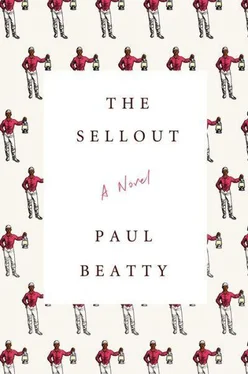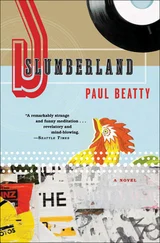“Are you pregnant?”
“Bonbon, don’t play yourself.”
Mad as she was at me, I couldn’t stop smiling, because I couldn’t remember the last time she’d called me Bonbon. While not the roughest sobriquet, it’s the closest thing I’ve ever had to a street name. When I was young I had a reputation for being extremely lucky. I never suffered from the typical ghetto maladies. I was never baby-shook. Never contracted rickets, ringworm, sickle-cell trait, lockjaw, early-onset diabetes, or the “’itis.” Hoodlums would jump my friends but leave me alone. The cops somehow never got around to putting my name on a scare card or my neck in a choke hold. I never had to live in the car for a week. No one ever mistook me for that punk who shot, raped, snitched on, impregnated, molested, welched, disrespected, neglected, or fucked over someone’s peoples. Rabbit’s Foot, Starchild, Four-Leaf-Lucky-Motherfucker, none of the nicknames stuck until, at eleven years old, I was involuntarily entered by my father in the citywide spelling bee sponsored by the now-defunct Dickens Bulletin , a paper so black the newsprint/ink color scheme was reversed, as in:

The finals pitted me against Nakeshia Raymond. Her word was “omphaloskepsis.” Mine was “bonbon.” And after that, up until the night my father died, it was Bonbon, pick my numbers. Bonbon, blow on my dice. Bonbon, take my civil service exam for me. Bonbon, kiss my baby. Yeah, since Pops got popped, people tend to keep their distance.
“Bonbon…” Marpessa squeezed her hands together to stop them from shaking. “I’m sorry about the way I treated you earlier. This fucking job…”
Sometimes I think that there’s no such thing as measurable intelligence and that, if there is, it definitely isn’t a predictor of anything, especially for colored people. Maybe morons can’t become brain surgeons, but a genius can be either a cardiologist or a postal clerk. Or a bus driver. A bus driver who made some fucked-up choices. Never put down the books, but after our brief relationship fell for an abusive old-school, then wannabe gangster rapper who dragged her out by her half-done hair in the mornings and, while she was still in her footy pajamas, forced her to case jewelry stores in the Valley. I never could figure why the places didn’t call the police immediately upon seeing a young African-American female suspect walk dead into the middle of the store exactly ten minutes after opening time, stare directly at the security guards and the cameras, while counting her steps out loud as she paced off the distance between the diamond rings and brooches.
Eyes blackened, she’d show up at my place, skulking in the shadows like a film noir villainess wanted for overacting and underappreciating her self-worth. College wasn’t for her, because to her mind the workplace turns black women into indispensable, well-paid number threes and fours, but never ones or twos. Sometimes getting pregnant early in life is a good thing. It slaps you to attention. Straightens your posture. Marpessa stood at the back door, eating a peach she’d pulled off the tree. The blood from her nose and lip mingled with the nectar, dripped down her chin and onto her shirt and once spotless sneakers, the sun behind her turning the edges of her frizzy undone hair into a flaming corona of split ends and shame. She wouldn’t come inside, she’d only say, “My water broke,” which of course broke my heart. A maniacal drive and an epidural later, Martin Luther King, Jr., Hospital, aka Killer King, got one right. A child, middle name Bonbon, a milk-guzzling, nipple-gnawing terror who serves as your incentive to apply for a Class B driver’s license, reminds you that next to Kafka, Gwendolyn Brooks, Eisenstein, and Tolstoy your favorite thing is to drive. Is to keep moving, to guide your bus and your life gently and slowly into the terminus and take a well-deserved respite.
“So you going to help out with Hominy?”
“Just get the fuck off the bus.”
With a push of the ignition button, the bus growled to life. Marpessa was next to go; she shut the door in my face, but slowly.
“You know, it was me that painted that line around Dickens.”
“I heard some shit about that. But why?”
“I’m bringing the city back. Bringing you back, too!”
“Good luck with that.”
Bouncing up and down Ocean Avenue in the back of a shit box pickup truck with some shaggy, aboriginal, blond-haired white boys, damn near as dark as you, their sun-baked faces peeling like the old “Local Motion” bumper stickers affixed to the tailgate, sometimes you feel more like a surfer than you do when you’re bellied atop your board staring into the misty horizon waiting for the next set. Kind enough to offer you a ride, you return the favor with smoke. Puffing and passing, and trying to keep your stick from getting dinged up with every California pothole hit and high-as-hell, whoa-dude-is-it-me-or-are-the-caution-lights-getting-shorter? sudden stop.
“Incredible bud, dude. Where’d you get this shit?”
“I know some Dutch coffee shop owners.”
That wintery day in the segregated state of Alabama, when Rosa Parks refused to give up her bus seat to a white man, she became known as the “Mother of the Modern-Day Civil Rights Movement.” Decades later on, a seasonally indeterminate afternoon in a supposedly unsegregated section of Los Angeles, California, Hominy Jenkins couldn’t wait to give up his seat to a white person. Grandfather of the post-racial civil rights movement known as “The Standstill,” he sat in the front of the bus, on the edge of his aisle seat, giving each new rider the once-over. Unfortunately for him, Dickens is a community as black as Asian hair, as brown as James, and after forty-five minutes of standing-room-only, all-minority ridership, the closest he got to a white person was the dreadlocked woman who got on at Poinsettia Avenue toting a rolled-up yoga mat.
“Happy birthday, Hominy,” she said gaily, standing over him, her face dripping Bikram sweat onto his shirtsleeve.
“How does everyone know it’s my birthday?”
“It says so on the front of bus. Big bright lights: Bus #125 Happy Birthday, Hominy! — Yowza, like a motherfucker!”
“Oh.”
“Did you get anything good for your birthday?”
Hominy pointed to the blue-and-white cigarette-box-sized signs stickered under the windows that lined the front third of the bus.
PRIORITY SEATING FOR SENIORS, DISABLED, AND WHITES
Personas Mayores, Incapacitadas y Güeros Tienen Prioridad de Asiento.
“That’s my birthday present.”
Dickens used to celebrate Hominy’s birthday as a collective. Not that there were parades and key-to-the-city accolades, but people would congregate outside his home chanting “Yowza!” and armed with eggs, peashooters, and meringue pies. They’d take turns ringing the doorbell. And when he answered, they’d shout, “Happy birthday, Hominy!” and hurl pastries and chicken ovum at his shiny black face. Ecstatic, he’d wipe himself clean, change clothes, and prepare himself for the next celebratory band of well-wishers, but when the city disappeared, so did the birthday tradition. It became just me knocking on his door and asking Hominy what he wanted for his birthday this year. His answer was always the same: “I don’t know. Just get me some racism and I’ll be straight.” Then he’d look to see if I was hiding a rotten tomato or a sack of flour behind my back. Some boys come round here and smush ’matoes in yo face? Usually I’d buy him some black Americana tchotchke. Two porcelain banjo-playing pickaninnies picking tunes underneath the Wisteria Tree, an Obama sock monkey, or a pair of eyeglasses that invariably slide down the bridges of African-American and Asian noses.
Читать дальше













